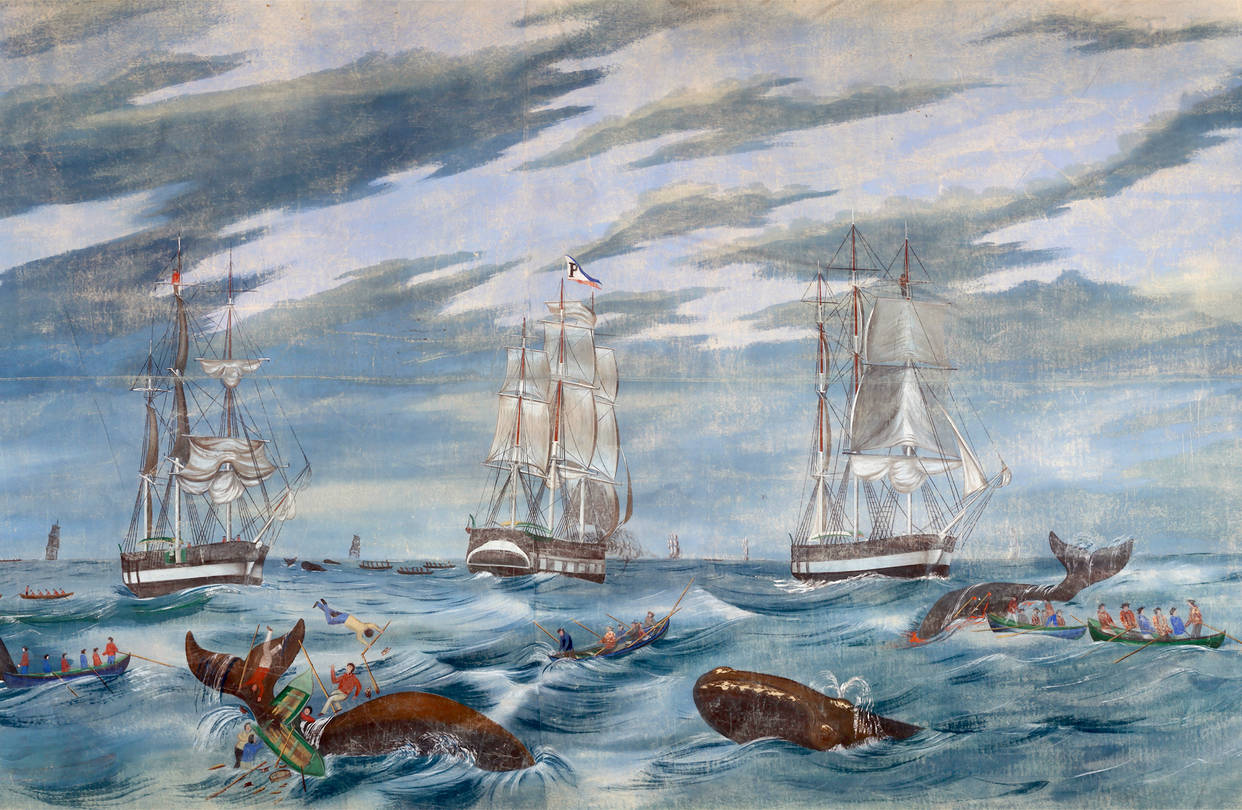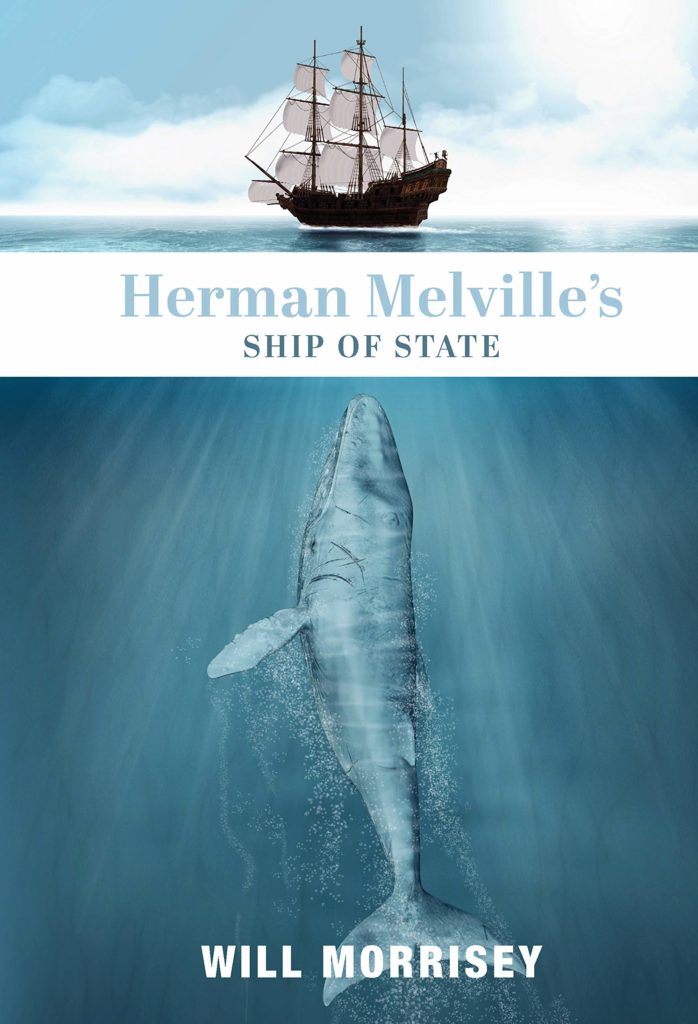This excerpt comes from William Morrisey’s latest book, Herman Melville’s Ship of State, which reads the classic novel, Moby-Dick, as an allegory of America, democracy and the reciprocal obligations of the individual and the state. Thus, is America Moby-Dick? Is its power a source of chaos or order? You will have to read the Morrissey’ intriguing book in order to arrive at the answers.
William Morrisey held the William and Patricia LaMothe Chair in the United States Constitution at Hillsdale College until his retirement in 2015. A native of Rumson, New Jersey, he served as Executive Director of the Monmouth County Historical Commission before his appointment at Hillsdale College in 2000. He is the author of eight books and has been an editor of Interpretation: A Journal of Political Philosophy since 1979. His reviews and articles have appeared in The New York Times, Social Science and Modern Society, Law and Liberty, The New Criterion, and many other publications.
Please support the excellent work being done by our friends over at St. Augustine’s Press and buy this book. You will not be disappointed.
In 1840, Alexis de Tocqueville published the second volume of Democracy in America, his magisterial study based on observations he had made on his nine-month visit to the United States nearly a decade earlier. Although we Americans understandably read his book as a treatise about ourselves, Tocqueville wanted less to understand America than to understand democracy. By “democracy” he meant not primarily a political regime of the kind seen in ancient Athens or in a modern-day New England township, but the condition of social equality, a society free of an aristocratic class legally entitled to rule ‘the commoners.’ In America, everyone is a commoner, and those who pretend otherwise invite ridicule. As an aristocrat himself, Tocqueville saw the decline of his class in Europe, a decline accelerated by both monarchy and republicanism in his own country. He called America “the sample democracy” in the world, the place to go to see what an egalitarian society looked like, how it thought and felt, its “habits of the mind and heart”—habits soon coming to a country near you, my fellow noblemen.
What political regimes would such societies see? Without the possibility of the rule of ‘the few,’ that left the rule of ‘the one’ or ‘the many.’ And because the long-ago replacement of small, ancient city-states with large modern nation-states precluded the direct rule of the people, rule of the many in the modern rule would mean representative government, republicanism. The regime alternatives for democratic societies in modern states were republicanism and despotism—to be seen, Tocqueville remarks, in America and Russia, respectively, “each destined to hold half the world in its hands one day.” To outline the structure of his preferred republican regime, he simply wrote an able summary of The Federalist, whose institutional structures might be adapted, although not simply carried over, by other ‘founders’ of republican regimes in other countries. But to describe democracy’s habits of heart and mind, the subtle and not-so-subtle ways in which egalitarian social conditions pervade the souls of those who live amidst them, this took several hundred pages.
The 1840s also saw the return to America of another voyager, Herman Melville. At the time Tocqueville was bringing out his Volume II, the young American, ten years Tocqueville’s junior, was signing up for his first whaling adventure, which began at the beginning of 1841. For nearly four years Melville experienced the democratic despotism of life at sea under several captains on a variety of ships, intermingled with sojourns on islands in the South Pacific, where a life of hedonist freedom rested uneasily on binges of cannibalism. The young sailor enjoyed the freedom without partaking of the fare; worrying that one day he might become part of a feast, he cut his island idyll short. For him, the remedy for shipboard despotism was either rebellion (he joined one mutiny) or exile (his adventures on shore occurred after he jumped his first ship).
The America he returned to in October 1944 was about to elect James K. Polk to the presidency. Along with Senator Stephen Douglas of Illinois and former president Franklin Pierce,
Polk was part of a new intellectual and political movement which registered a generational shift in the American conception of the right basis for law and liberty. Whereas the founding generation had understood republican regime-building as an attempt to secure unalienable natural rights for “all men” under that regime, and the generation after that was divided over whether “all men” included slaves (New England said yes, the South, increasingly, said no), this third generation of Americans began to see republicanism less as security for rights as security for, and the best expression of, democracy itself, of the social egalitarianism Tocqueville had described. Might that not lead to majority tyranny, the rule of ‘the people’ in its might instead of popular sovereignty under the laws of nature and of nature’s God?
Having just voyaged on seas even broader than the American continent, seas where might is indeed taken to make right, whether in the form of a captain on a ship or of mighty Leviathan underneath that ship, Melville had seen that a diverse and egalitarian society could find its ruler not in a popular majority but in one person. With no aristocratic class to serve as mediator between the one and the many, each pole of the political world would threaten the other. Fear of the many might cause the one to rule by fear absolutized, by terror. Tocqueville never wrote on Napoleon or on the Russian czar. In Moby-Dick, Melville did.
He could do so because he had survived and learned from what might be described as the photographic negative of Tocqueville’s experience: Instead of voyaging to democratic-republican America from a Europe beset by unstable monarchies, a declining aristocracy, and constant threats of war and violent revolution, Melville had voyaged from America to societies in the condition of a state of nature—communitarian and pleasure-loving, to be sure, but with a sinister undercurrent of manslaughter, the faint smell of blood mingling with fragrance of the tropical flowers. He had voyaged on ships ruled by ‘princes’ (with the title of captain) wielding absolute power unknown to American landholders, even to the most adventurous pioneers. Returning to America, he too had an outsider’s perspective, the ability to think like what we now call a political comparativist. In Moby-Dick he shows what a multi-ethnic, multi-religious democratic society would be under the regime of tyranny.
The featured image shows a portion of “Grand Panorama of a Whaling Voyage ’Round the World,” by Benjamin Russell and Caleb Purrington, which was first exhibited in 1848. It is America’s longest painting, at 1275 feet in length.

